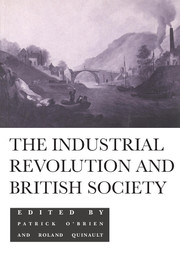Book contents
- Frontmatter
- Contents
- List of contributors
- Preface
- 1 Introduction: Modern conceptions of the Industrial Revolution
- 2 Women in the workforce
- 3 Reinterpretations of the Industrial Revolution
- 4 Religion and political stability in early industrial England
- 5 Sex and desire in the Industrial Revolution
- 6 Political preconditions for the Industrial Revolution
- 7 Crime, law and punishment in the Industrial Revolution
- 8 The Industrial Revolution and parliamentary reform
- 9 Margins of the Industrial Revolution
- 10 Social aspects of the Industrial Revolution
- 11 Technological and organizational change in industry during the Industrial Revolution
- Postscript: An Appreciation of Max Hartwell
- Index
3 - Reinterpretations of the Industrial Revolution
Published online by Cambridge University Press: 05 June 2012
- Frontmatter
- Contents
- List of contributors
- Preface
- 1 Introduction: Modern conceptions of the Industrial Revolution
- 2 Women in the workforce
- 3 Reinterpretations of the Industrial Revolution
- 4 Religion and political stability in early industrial England
- 5 Sex and desire in the Industrial Revolution
- 6 Political preconditions for the Industrial Revolution
- 7 Crime, law and punishment in the Industrial Revolution
- 8 The Industrial Revolution and parliamentary reform
- 9 Margins of the Industrial Revolution
- 10 Social aspects of the Industrial Revolution
- 11 Technological and organizational change in industry during the Industrial Revolution
- Postscript: An Appreciation of Max Hartwell
- Index
Summary
Industrial Revolution: concept and significance
Britain's Industrial Revolution has an enduring fascination. Successive generations of economic historians have reinterpreted the significance of economic change in Britain between about 1760 and 1860. The term, Industrial Revolution, is loose enough to accommodate changes of interest. It was used by a French economist, Blanqui, in 1837 to draw attention to some parallels and contrasts between developments in Britain and the marked and sudden redistribution of political power at more or less the same time in France, for which the term ‘Revolution’ was well established. There had been changes in Britain which could be seen as at least equally fundamental. Defining and explaining those changes is a never-ending task.
There were big advances in scholarly study in the later nineteenth century. Modern disciplines gradually emerged as convenient subdivisions for teaching and advancing knowledge. History was separated from current politics, and economics was established as a distinctive specialization. Economic history developed at the same time, although its literature took longer to be readily identified and it never separated from history and economics to the same extent as some other disciplines separated from their parents. Part of the growth of economic history as an academic discipline was study of the Industrial Revolution.
- Type
- Chapter
- Information
- The Industrial Revolution and British Society , pp. 54 - 78Publisher: Cambridge University PressPrint publication year: 1993
- 4
- Cited by



